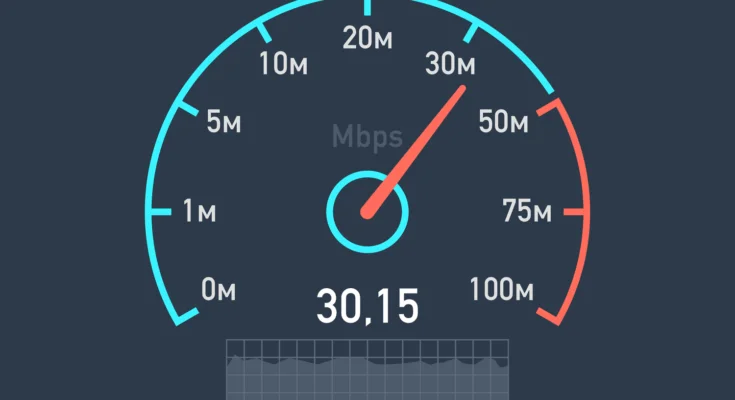In this digital age, a swift and dependable internet connection has become indispensable. Whether you’re binge-watching your favorite series, navigating remote work, or immersing yourself in online gaming, a sluggish connection can be utterly exasperating. Have you ever found yourself enduring buffering delays or encountering glitches during a pivotal virtual meeting? Grasping the nuances of your internet speed can empower you to mitigate these nuisances head-on.
But what exactly constitutes “internet speed”? How do various dynamics influence it? And how can you easily verify whether you’re receiving the bandwidth your provider pledged? This comprehensive guide will walk you through the essentials of internet speed and offer strategies for improvement. Let’s embark on an exploration of connectivity!
The Significance of Internet Speed
Internet speed underpins the quality of our digital experiences. From perusing websites to downloading files and streaming videos, a sluggish connection can transform simple tasks into tedious endeavors.
In an era dominated by remote work and online education, fast internet is no longer a luxury—it’s a necessity. Interruptions during video conferences or lag in presentations can derail productivity and disrupt communication flow.
For households with multiple occupants, the strain becomes even more palpable. When several users stream content or engage in online gaming concurrently, speed becomes paramount for uninterrupted connectivity.
High-speed internet serves as a conduit not only for entertainment but also for sustaining social and professional connections. As our reliance on digital platforms escalates, ensuring sufficient internet speed has become crucial for seamlessly navigating daily life.
Decoding Internet Speed Measurements
Understanding the metrics of internet speed can initially appear bewildering. Yet, comprehending these measurements is pivotal for evaluating your online performance.
The most prevalent unit is megabits per second (Mbps), which quantifies the volume of data transmitted each second. A higher Mbps equates to faster downloads and smoother streaming experiences.
Another critical factor is latency, gauged in milliseconds (ms). Latency refers to the delay before data begins transferring following a request. Reduced latency translates into quicker response times, a vital factor for online gaming and video conferencing.
Additionally, upload speed and download speed are key elements. Download speed refers to how swiftly data is retrieved from the internet, while upload speed measures how fast data is sent. Maintaining equilibrium between both speeds ensures optimal performance across various online activities.
Being acquainted with these metrics enables users to make informed assessments of their connectivity and consider potential upgrades or adjustments to optimize performance.
Factors Influencing Internet Speed
A myriad of factors can significantly affect your internet speed. One primary determinant is the type of connection. Fiber optic connections generally provide faster speeds compared to DSL or cable.
Network congestion is another consideration. During peak usage hours, bandwidth is shared among multiple users, which can lead to slower speeds. This is particularly common in residential areas during the evening when everyone is online.
The proximity of your device to the router also impacts speed. Greater distances can weaken signals, especially if there are walls or obstacles between the router and your device.
The hardware you’re using also plays a role. Older devices may not support higher speeds, limiting your connection regardless of your internet plan.
Background applications running on your device might be consuming bandwidth unnoticed, further contributing to slower performance.
How to Assess Your Internet Speed?
To check your internet speed, start by ensuring you are connected to your network. Using a desktop or laptop typically yields more accurate results.
Next, close any unnecessary applications or browser tabs to reduce bandwidth consumption during the test.
Navigate to a reputable speed test website, such as Ookla’s Speedtest or Fast.com. These platforms are intuitive and provide quick feedback on your connection’s performance.
Click the “Go” button to initiate the test, and within a minute, you’ll be presented with key metrics—download speed, upload speed, and ping time—that reveal how well your internet is functioning under current conditions.
Running multiple tests at various times can offer a broader understanding of your connection’s stability and reliability.
Optimal Tools for Internet Speed Testing
Several tools are especially adept at measuring internet speed, offering both accuracy and ease of use. Speedtest by Ookla is a widely favored option, providing an uncomplicated method to gauge download, upload speeds, and latency.
Fast.com, developed by Netflix, is another excellent choice, particularly for those focused on streaming speeds.
For more in-depth insights, Google’s built-in speed test offers a quick overview directly from the search results page. Simply search “internet speed test,” and you’ll receive results almost instantaneously.
A lesser-known but highly effective tool is Measurement Lab (M-Lab), which not only measures speed but also diagnoses potential network issues. These tools collectively equip you with a clearer understanding of your internet’s capabilities.
Strategies to Enhance Internet Speed
Improving your internet speed can vastly elevate your online experience. Start by positioning your router in a central location, ensuring more consistent coverage throughout your space.
Whenever possible, opt for a wired connection instead of Wi-Fi. Ethernet cables generally provide more stable and faster speeds than wireless connections.
Reducing the number of connected devices on your network can also alleviate bandwidth strain, leading to improved speeds.
Regularly updating your router’s firmware is critical. Manufacturers often release updates that enhance performance and security.
If slowdowns occur during peak hours, try to limit bandwidth-heavy activities such as streaming or gaming to off-peak times.
Conclusion
Regularly testing your internet speed is key to optimizing your online experience. Armed with a clearer understanding of the factors affecting speed and using reliable tools to monitor performance, you can preempt issues before they escalate.
While enhancing your internet connection may require time and effort, the rewards—a seamless browsing experience, faster downloads, and uninterrupted streaming—are well worth it. Whether you’re working from home or seeking online entertainment, mastering your internet speed will keep you connected without the frustration of slow performance.
Remain vigilant, as shifts in technology and service providers can impact your speed over time. Staying informed about best practices for maintaining optimal speeds ensures that every online interaction is smooth and efficient.




